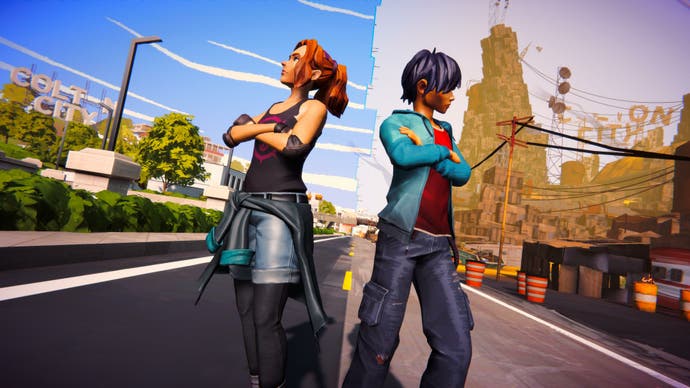Road 96: Mile 0 review - a loveable tangle of concepts and moods
It's a trip.
Road 96 was an ingenious game that could feel, at times, like a bit of a mess. Set in Petria, an Americana-tinged totalitarian state, it followed a range of teens who were making a break for the border and a better life. Even now, the thought of the whole thing dazzles me a little: one by one, you take these teens from deep inside the country as they make their hardscrabble way to potential freedom. Hitchhiking, hiding out in lorries, jammed in the back of a cop car, each attempt had a beginning and an end, and then you'd do it all over again with a new protagonist.
The hook - and it was a great hook - is that these separate attempts would overlap in terms of the personnel they involved. So you'd encounter the same truckers, cops, and bank robbers again and again at different points in their own stories. Over the course of the game a rich portrait emerged, even if, looking back, I'm not sure exactly what it was a portrait of. Petria itself? The human spirit? The lasting appeal of 90s road movies? Anyway, it was vivid and empathetic and ambitious and surprising, the perfect match for the game's sunburned, rough-textured art style.
Now here's Road 96: Mile 0. It's a prequel to the first game, and it feels, at times, like a bit of a mess. And actually, I think it is a mess - but I'm not sure that's necessarily a bad thing. Why is it a mess, though? I wonder if it's the mileage. The same thrumming energy of Road 96 is here, but the endless scoring and underscoring of that journey to the border is missing. This is the moment before everyone started to flee, so the game's antic enthusiasm for strange encounters and oddball asides has to work within confines. It's a Catherine wheel stuck in starting position on a fence as it sparks and splutters. It's a cat trying to get itself out of a duvet.
Mile 0 follows two teenage friends, Zoe (who will be familiar to players of Road 96) and Kaito (who won't be). Zoe is the daughter of a minister in Petria's corrupt government. Kaito's parents work for The Man and live in a basement apartment. They have come together through a love of skating and dropping out, and perhaps through having childhoods warped, albeit in different ways, by an uncaring regime. But as the game starts, they don't really know each other. Kaito is on the brink of revolution. Zoe is on the brink of understanding why some people might want a revolution. The game that follows is their journey outwards from these points.
Sort of. What actually follows is a fascinating mix-up of Life is Strange-style conversations as two teens work out the contours of their relationship, a few cameos from Road 96 itself, and a bunch of scattershot mini-games to break up the action. One minute they're talking about Zoe's missing mother, and then the next they're redecorating their slacker HQ, located in a plyboard building site. They talk about inequality and cause havoc for a local Tai chi group. A favourite trucker from the first game appears with a mysterious agenda, and then you get a game of Connect Four.
And there's skating. Lots of skating. Big moments in Year 0 play out in elaborate skating challenges, as you move through landscapes built from the character's dreams and emotions, collecting counters and avoiding hazards. It's quite fun: duck, jump, switch lanes, avoid fallen trees, shattering roads and the grabbing hands of government statues come to life. It's not necessarily terribly responsive to control at all times, but it has friendly restarts and a real sense of flair and drama.
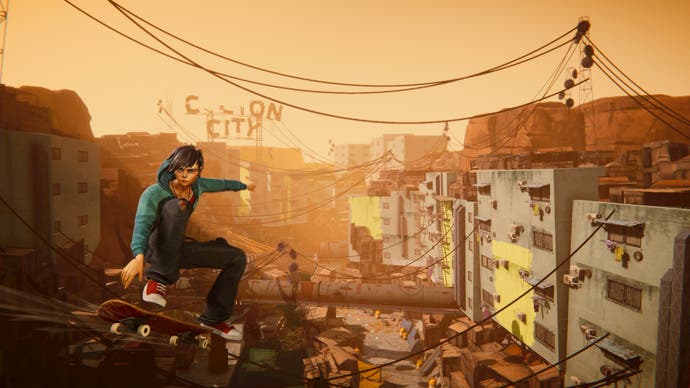
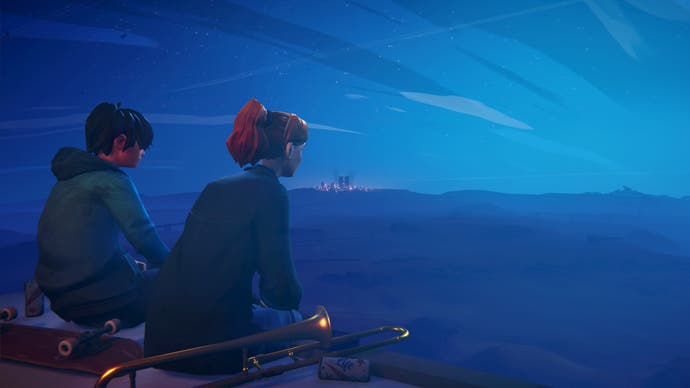
Looking back, it's a bit like being in a musical really, the kind of musical that has enough time between the big numbers for you to forget it's a musical in the first place. Everyone's getting upset, something's going to give, and then you get a song! And you think: oh yes, this does happen here doesn't it? Zoe and Kaito will be inching towards a realisation about something, or putting a prank together, or planning a push-back against the regime, and suddenly it's skates-on and we're moving through a world of Technicolor imagination.
Sometimes this works beautifully. There's a lovely early moment in which the duo travel through the imagined paradise of a nearby city and then the ugly reality behind the propaganda. There's a moment later on in which Kaito imagines the journey to freedom as an endless trip through a snowy forest: we're given time to just witness his exhilaration. Sometimes, though, there's a sense that the game has not defined its own boundaries. And this filters through everything else in this strange, slapstick, totalitarian world, where the dictator has elaborate laser mazes guarding his office safe, and where a clumsy regime bodyguard is desperately in love with the local TV star.
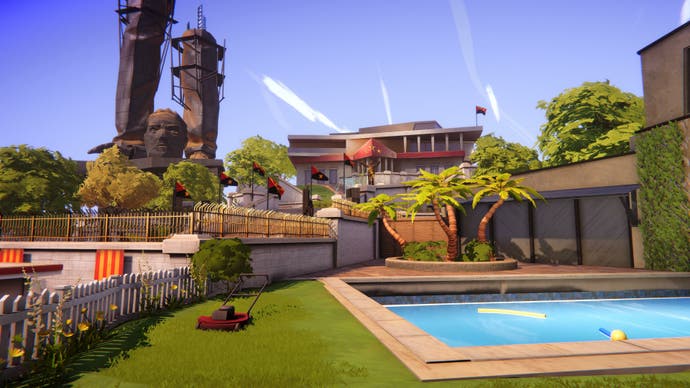
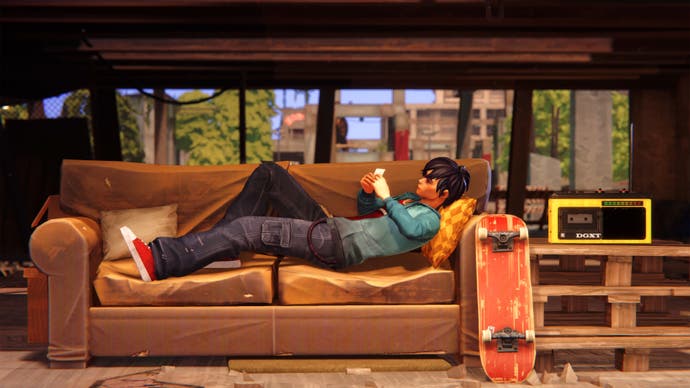
As the narrative lurches towards its conclusion, these strange jumps in tone get more disorientating, as does the role of the player. I spent the entire game nudging two little meters on the screen, one for each of the main characters, choosing dialogue options that theoretically shifted Zoe and Kaito closer to a kind of understanding. But halfway through the last act, I discovered that, for all of my work, I didn't really understand anyone's motivation going into the gloriously bizarre conclusion. The point here is to play the game several times and get different endings. It feels like a victory of sorts, I guess, that I'm still puzzling over the ending I got the first time around.
The thing is, weird as all this is, I suspect that nothing in Mile 0 is as weird as totalitarianism in the first place. I'm tempted to say that Mile 0 can get away with any flights of fancy in a world that has seen a president's attorney give a press conference at Four Seasons Total Landscaping, an establishment which is located, inevitably, next to a sex shop and a crematorium. Is Mile 0's stranger elements a reaction to that, and to the strange shapes that authoritarianism contorts people into? I don't know. But I will keep puzzling away at what I've experienced, I think, and trying to make sense of what I've witnessed here.
